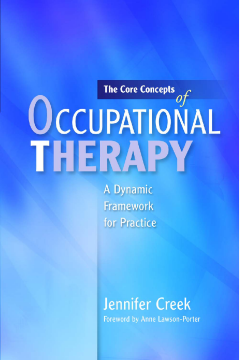
Additional Information
Book Details
Abstract
The profession of occupational therapy has a highly specialised language, but until now there have been no standard definitions of its key terms.
Based on the work of the terminology project group of the European Network of Occupational Therapy in Higher Education (ENOTHE), this book selects and defines the core building blocks of occupational therapy theory. Consensus definitions of a wide range of terms are developed through an analysis of published definitions from around the world. Concepts with similar meanings are clustered into groups, and the clusters are then arranged into a conceptual map. The book provides an analysis of what each term means in common usage, how it is used in occupational therapy, and its implications for therapeutic practice. The conceptual framework that emerges represents an important contribution to the profession's understanding of the fundamental concepts of occupational therapy.
The consensus definitions presented in this book will facilitate communication between professionals as well as with clients and others, and will be of interest to occupational therapy practitioners, students, educators and researchers.
I relished the fact that this book celebrates the depth, detail and complexity of occupational therapy and that it is able to clearly articulate this to the reader.
This book should be required reading for all students, educators and researchers as well as practitioners. I'm sure this book will develop into a key text and one that you will see on all our book shelves. It is a book that I devoured in one sitting, but one that I know I will be picking up often to refresh my thinking and remind myself aspects of detail.
Simons Hughes, Consultant occupational therapist
I really enjoyed reading this book, a potentially dry topic area has been described with passion in clear language allowing the reader to readily access precisely expressed logical concepts that underpin our professional practice.
Simon Hughes, Consultant occupational therapist
... a useful reference book, which helps to clarify the semantics which we use every day in our in conversations with clients, doctors and other medical personnel, and it has helped to clarify a number of concepts for me after forty five years as a practising occupational therapist.
South African Journal of Occupational Therapy
Jennifer Creek is a freelance occupational therapist and a Mental Health Act Commissioner for the Care Quality Commission. She has been writing and speaking about occupational therapy theory and terminology for over 20 years, and has been working with the ENOTHE terminology group since 2003.
We all read extensively in our professional lives. You will all be able to recall those articles and books that have been the most influential in developing your thinking. You may also recognise that those influential texts can most probably be counted on the digits of two hands. This book will be one of my ten most influential texts and I commend the working group for adding to occupational therapy's body of knowledge.
Anne Lawson-Porter, Head of Education and Learning, College of Occupational Therapists, London
